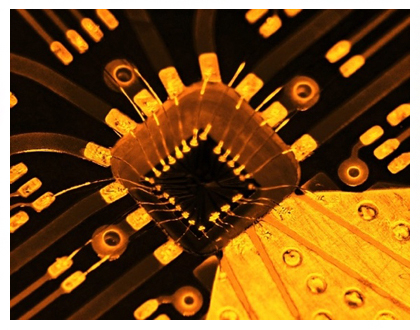
理研:「量子ビット」をシリコン半導体で作製(動画):
RIKEN: Making “qubits” from silicon semiconductors:
RIKEN:用硅半导体制造“量子比特”:
ー超伝導のライバルが出現ー
理化学研究所
国際研究チームが英科学誌ネイチャーに1月20日、発表した。
「量子ビット」をシリコン半導体で作り、応用可能な精度で操作することに成功した。
シリコンを使った量子コンピュータは大規模化に向いている。
量子コンピュータ実現に向けた一歩となる。
量子コンピュータの計算エラー:
量子コンピュータは、
計算を超高速で行える可能性を秘めるが、計算エラーが起きやすいことが課題だ。
素子の操作で99%精度:
実用化には、素子の操作一つ一つで99%以上の精度が必要だ。
従来、シリコンの量子ビットでは、
2素子を連動させる操作の精度が、98%止まりだった。
理研創発物性科学研究センター
樽茶清悟・副センター長
国際チームは、
シリコン内微小空間に電子2個を閉じ込め、電子の磁気的な性質を利用する量子ビットを作製。
永久磁石とマイクロ波を組み合わせた独自手法で、
これを操作し、99・5%の精度を達成した。
実際に、量子コンピュータ用計算を2種類実施。
高い確率で正答が出ることを確認したという。
「超伝導」など3方式:
これまで「超伝導」など3方式でも、同レベルの量子ビットが作られた。
シリコン半導体の強み:
シリコン半導体は既に発達している加工技術など、様々な強みがある。
これから大規模化を目指す。
産業技術総合研究所
新原理研究センター
今まで超伝導方式の独り勝ちだった。
しかし、シリコン半導体と云う強力なライバルが現れた。
大規模量子コンピュータへの期待を抱かせる。
科学・IT : 読売新聞オンライン
https://www.yomiuri.co.jp/science/20220119-OYT1T50275/
Scientists achieve key elements for fault-tolerant quantum computation in silicon spin qubits
To do the current work, published in Nature, the group decided to experiment with a quantum dot structure
that was fabricated by nanofabrication on a strained silicon/silicon germanium quantum well substrate, using a controlled-NOT (CNOT) gate.
In previous experiments,
the gate fidelity was limited due to slow gate speed.
To improve the gate speed,
they carefully designed the device and tuned the device operation condition
by voltages applied to gate electrodes to combine established fast single-spin rotation technique using micromagnets and a large two-qubit coupling.
This allows them
to enhance the gate speed by a factor of 10 compared to the previous works.
Interestingly,
it was previously believed the increasing gate speed would always lead to better fidelity,
but they found that there was a limit, and that beyond that the increasing speed actually made the fidelity worse.
Through the work, they discovered that
a property called the Rabi frequency—a marker of how the qubits change states in response to an oscillating field—
is key to the performance of the system, and they found a range of frequencies
for which the single-qubit gate fidelity was 99.8 percent and the two-qubit gate fidelity was 99.5 percent, clearing the required threshold.
To test the capability of the new system, the researchers implemented
a two-qubit Deutsch-Jozsa algorithm and the Grover search algorithm.
On both algorithms output correct results with a high fidelity of 96-97%,
demonstrating that silicon quantum computers can perform quantum calculations with high accuracy.
RIKEN
https://www.riken.jp/en/news_pubs/research_news/pr/2022/20220120_1/index.html
Fast universal quantum gate above the fault-tolerance threshold in silicon | Nature